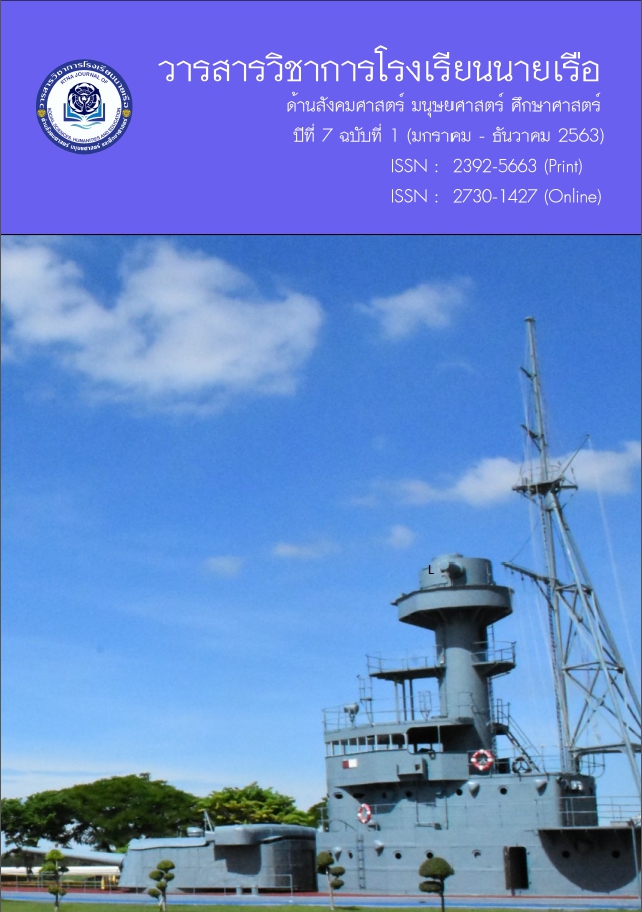การพัฒนาความสุขในกองทัพเรือด้วยแนวคิดการเรียนรู้ตลอดชีวิตและการเรียนรู้ เพื่อการเปลี่ยนแปลง
คำสำคัญ:
การเรียนรู้ตลอดชีวิต, ความสุข, การเรียนรู้เพื่อการเปลี่ยนแปลงบทคัดย่อ
กองทัพเรือเป็นหน่วยงานที่ดูแลความมั่นคงทางทะเลของประเทศ ซึ่งกองทัพเรือจำเป็นต้องเข้าใจและปรับตัวรองรับต่อการเปลี่ยนแปลงสภาวะแวดล้อมด้านความมั่นคงอยู่ตลอดเวลา การทำความเข้าใจและปรับตัวเข้ากับสภาวะแวดล้อมด้านความมั่นคงได้นั้น ปัจจัยสำคัญขึ้นอยู่กับการเรียนรู้และการศึกษาของบุคลากรภายในกองทัพเรืออย่างต่อเนื่องในลักษณะการเรียนรู้และการศึกษาตลอดชีวิต โดยผลสัมฤทธิ์ของ การเรียนรู้ของบุคลากรภายใต้บริบทนี้ จะพัฒนาความสุขให้กับบุคลากรในองค์กรกองทัพเรือและพัฒนาองค์กรให้เป็นองค์กรที่มีความสุข บทความนี้มีวัตถุประสงค์เพื่อแสดงให้เห็นว่า “การเรียนรู้ตลอดชีวิตและ การเรียนรู้เพื่อการเปลี่ยนแปลงนั้นสำคัญอย่างไรต่อการพัฒนาองค์กรเปี่ยมสุข (Happy Workplace) ” โดยมีคำตอบเบื้องต้นคือ การเรียนรู้ตลอดชีวิตด้วยการเรียนรู้เพื่อการเปลี่ยนแปลงนำมาซึ่งความสุขในกองทัพเรือ เนื่องจากการเรียนรู้ของบุคลากรก่อให้เกิดกระบวนการพัฒนาความสุขจากภายในตัวของบุคลากร โดยเมื่อบุคลากรมีความสุข กองทัพเรือในฐานะองค์กรที่เกิดจากการรวมกันของบุคลากรที่มีความสุขย่อมพัฒนาขึ้นเป็นองค์กรแห่งความสุขได้ สำหรับการเปลี่ยนผ่านในลักษณะดังกล่าวได้นั้นจำเป็นต้องใช้วิธีการเรียนรู้ เพื่อการเปลี่ยนแปลง ซึ่งก่อให้บุคลากรเกิดความตระหนักรู้ถึงความสำคัญของการเรียนรู้และความร่วมมือภายในกองทัพเรือ
เอกสารอ้างอิง
จันทรชัย ถวิลพิพัฒน์กุล. (2558). อนาคตภาพของรูปแบบการเรียนรู้สู่การเปลี่ยนแปลงเพื่อการสร้างเสริมองค์กรสุขภาวะอย่างบูรณาการ. (ปริญญาครุศาสตรดุษฎีบัณฑิต สาขาวิชาการศึกษานอกระบบ โรงเรียน). กรุงเทพฯ: จุฬาลงกรณ์มหาวิทยาลัย.
ชนัดดา ภูหงส์ทอง. (2560). การเรียนรู้สู่การเปลี่ยนแปลง: ความท้าทายของผู้สอนในระดับอุดมศึกษา. วารสารพฤติกรรมศาสตร์, 24(1), 163-182.
พระราชบัญญัติการศึกษาแห่งชาติ (ฉบับที่ 4) พ.ศ.2562. (2562, 1 พฤษภาคม). ราชกิจจานุเบกษา.
เล่ม 136 ตอนที่ 57 ก. หน้า 49-53. สืบค้น 9 มกราคม 2563, จาก http://www.ratchakitcha.soc.go.th/DATA/PDF/2562/A/057/T_0049.PDF
วิจารณ์ พานิช. (2558). เรียนรู้สู่การเปลี่ยนแปลง (Transformative Learning). กรุงเทพฯ: เอส.อาร์.
วีรฉัตร สุปัญโญ. (2561). การพัฒนาทรัพยากรมนุษย์. ใน เอกสารประกอบการสอน วิชา 2750863 การศึกษานอกระบบโรงเรียนเพื่อส่งเสริมการเรียนรู้ตลอดชีวิตในองค์กร. (น. 23-25). กรุงเทพฯ: จุฬาลงกรณ์มหาวิทยาลัย.
อาชัญญา รัตนอุบล. (2559). การเรียนรู้ของผู้ใหญ่และผู้สูงอายุในสังคมไทย. กรุงเทพฯ: โรงพิมพ์แห่งจุฬาลงกรณ์มหาวิทยาลัย.
อาชัญญา รัตนอุบล. (2562). แนวคิดการส่งเสริมการศึกษาตลอดชีวิตในสังคมไทย. กรุงเทพฯ: โรงพิมพ์แห่งจุฬาลงกรณ์มหาวิทยาลัย.
Adams, D. N. (2007). Lifelong Learning Skills and Attributes: The Perceptions of Australian Secondary School Teachers. Issues in Educational Research, 17(2), 149-160.
Capra, F. (1986). The Concept of Paradigm and Paradigm Shift. Journal of Consciousness and Change, 9, 11-17.
Cranton, P. (2016). Understanding and promoting transformative learning: a guide to theory and practice. (3rd ed.) San Francisco: Jossey-Bass.
Darwin, C. (1859). On the Origin of Species by Means of Natural Selection. Retrieved April 15, 2020, from https://en.wikipedia.org/wiki/On_the_Origin_of_Species
Dirkx, J. M. (1998). Transformative Learning Theory in the Practice of Adult Education. Journal of Lifelong Learning, 7, 1-14.
Dong, W. (2004). Improving Students' Lifelong Learning Skills in Circuit Analysis. China Papers, 4(November), 75-78.
IIIerris, K. (2004). Transformative Learning in the perspective of a comprehensive learning theory. Journal of Transformative Education, 2(2), 79-89.
Kitchenham, A. (2008). The Evolution of John Mezirow's Transformative Learning Theory. Journal of Transformative Education, 6(2), 104-123
McEwen, R. M. (2006). A Critical Analysis of Transformative Learning Theory: Utilizing a Social Constructionist Framework: Toward a Theoretical Model with Implications. (the degree of Doctor of Philosophy). Trinity International University.
Mezirow, J. (1991). Transformative Dimensions of Adult Learning. San Francisco: Jossey Bass Publisher.
Mezirow, J. (2000). Learning as Transformation: Critical Perspectives on a Theory in Progress. The Jossey-Bass Higher and Adult Education Series. San Francisco: Jossey-Bass.
Sherry, K.-R. K. (2012). Exploring the Habitus: A Phenomenological Study of Transformative Learning Processes. (the degree of Doctor of Education). Faculty of The Graduate School of Education and Human Development.
Taylor, E.W. (1997). Building on the theoretical debate: A critical review of the empirical studies of Mezirow s transformative learning theory. Adult Education Quarterly, 48(1), 34-60.
UNESCO. (1996). World Education Report 1995. Oxford: Oxford University Press.
ดาวน์โหลด
เผยแพร่แล้ว
ฉบับ
ประเภทบทความ
สัญญาอนุญาต
เนื้อหาและข้อมูลในบทความที่ลงตีพิมพ์ในวารสารวิชาการโรงเรียนนายเรือ ด้านสังคมศาสตร์ มนุษยศาสตร์ และ ศึกษาศาสตร์ ถือเป็นข้อคิดเห็นและความรับผิดชอบของผู้เขียนบทความโดยตรง ซึ่งกองบรรณาธิการวารสาร ไม่จำเป็นต้องเห็นด้วย หรือร่วมรับผิดชอบใด ๆ
บทความ ข้อมูล เนื้อหา รูปภาพ ฯลฯ ที่ได้รับการตีพิมพ์ในวารสารวิชาการโรงเรียนนายเรือ ด้านสังคมศาสตร์ มนุษยศาสตร์ และ ศึกษาศาสตร์ ถือเป็นลิขสิทธิ์ของโรงเรียนนายเรือ หากบุคคลหรือหน่วยงานใดต้องการนำทั้งหมดหรือส่วนหนึ่งส่วนใดไปเผยแพร่ต่อหรือเพื่อกระทำการใด ๆ จะต้องได้รับอนุญาตเป็นลายลักษณ์อักษร จากโรงเรียนนายเรือก่อนเท่านั้น






